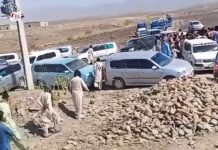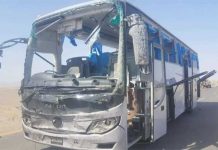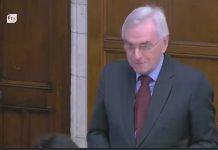13 November — The Baloch Martyrs’ Day
TBP Report!
The year was 1801 when Shah Shujah Durrani, the ruler of the Durrani dynasty, declared himself to be the King of Afghanistan after the deposition of his brother Zaman Shah. Despite being securely at the helm, he saw enemies everywhere. He wanted to put an end to all the competition, but he could not kill his rivals, as it would pose a grave challenge to the legitimacy of his rule. But Shujah had his ways: It was the tradition at the time that a blind man could not be the Emir, the ruler of Afghanistan. So he had his rival blinded and, therefore, smoothly ascended to the throne in 1803.
But the golden days were soon over – Shujah was deposed in 1809 by his predecessor Mahmud Shah and went into exile in Punjab. In the same year, Shujah partnered with the British in an attempt to restore himself at the helm. With a little help from Ranjit Singh, the ruler of Punjab, Shujah could now easily seize the power and re-establish himself as the King of Afghanistan. But there was a problem – in order to reach Kabul and overthrow the Afghan ruler, there was only one route. And that route cut through Balochistan.
After endless negotiations with Nawab Mehrab Khan, the ruler of Kalat, the British acquired permission to cross through Balochistan into Afghanistan. But unlike the acquiescent Khan, his subjects were less receptive to the British. During their transit through Balochistan – especially through the Bolan Pass – the British forces confronted serious resistance from the local Baloch tribes. But they eventually managed to reach Kabul, dethrone Dost Muhammad Khan and reinstate Shujah into Power in 1839. And now with their ally firmly at the helm, the Brits turned to Balochistan to avenge their losses.
The British forces descended on Kalat and the capital was taken by a storm. The Khan and his forces were vastly overpowered, but they fought valiantly. They were eventually martyred on November 13, 1939, and Balochistan was occupied by the British. That day, the Khan and his fighters set up a path to resistance – a path that numerous others followed whenever an outside force has tried to occupy Balochistan. In memory of Khan’s honourable sacrifice, November 13 was declared the “Baloch Martyrs Day” and it is commemorated every year by hundreds of thousands in and out of Balochistan. Each year, the martyrs of the Baloch national struggle are remembered and honoured.
The history was once again repeated when Pakistan attacked and occupied Balochistan in 1948; a spark was lit that has now grown into a conflagration. For the past seven decades, Balochistan has witnessed five waves of insurgency, each deadlier than the last, and engulfed the entire Balochistan. Whenever injustice and cruelty have raised their heads, someone has stood up to crush it. Balochistan is currently mired in the fifth and by far the longest wave of insurgency. This wave, by its very nature, is much elaborate and dangerous than the rest. It has garnered support not only from nationalist groups but also from the general people. Shattering the stereotype surrounding them in the Baloch society, the Baloch women have also joined the ranks of their male compatriots in the struggle for the independence of Balochistan. The educated faction of the Baloch society now form the backbone of the Baloch struggle; they are at the frontline of the Baloch cause. The ongoing wave of insurgency is now deeply intertwined with every facet of the Baloch society – it is as much political as it is militaristic.
In a media statement on Saturday, Baloch National Movement Chairman Khalil Baloch paid tribute to Nawab Mehrab Khan Baloch for sacrificing his life in the protection of his motherland. He said that despite meagre ordnance and resources, Mehrab Khan valiantly stood up to the occupying forces and set up an example of resistance. He said that this sacrifice revitalised the Baloch movement and made the oppressed nations believe that resistance is the only option at their disposal to overthrow their occupation.
He said that Mehrab Khan’s martyrdom is a lesson that nations can only survive through sacrifices. He said that we have to endure all the hardships that come our way and embrace the sacrifices that have to be made. Independence requires resistance and patience, and if we follow the path set up for us by the martyrs, no power in the world can stop us from reaching our destination, he said.
Baloch Student Organization Azad (BSO-Azad) also paid tribute to Nawab Mehrab Khan and his comrades for sacrificing their lives for repelling the hostile foreign powers. In a media statement, Abram Baloch, the Chairman of the organization, said that Mehrab Khan took a historical decision against foreign expansionism on November 13, 1839, that is being followed to this day.
Chairman Abram Baloch said that independence is not achieved only through war – it requires the renovation and reconstruction of an entire society. No doubt we will face challenges in this path and prove ourselves to be a conscious nation. He said that success is only possible when we follow the footsteps of the martyrs and work to promote consciousness among our societies.
The BSO-Azad chairman said that on this day, we must vow to follow the path set up for us by the martyrs of Balochistan and face all the challenges courageously that will come on our way. The independence of Balochistan and the formation of a conscious nation will be the ultimate fruit of the martyrs’ sacrifices, he added.
The National Democratic Party also paid its tributes to the martyrs of Balochistan on Baloch Martyrs Day. In a media statement, the NDP said that Nawab Mehrab Khan valiantly fought against foreign occupation and gave his life in the protection of his motherland. From that day onwards, the Baloch have continuously fought to repel foreign occupation and preserve their national identity. The NDP said that we pay tributes to the martyrs of Balochistan; we owe our existence to them. The martyrs sacrificed their lives because they were concerned for the future of their land and people. It is because of their sacrifices that we can now proudly look at the world.
Dr. Allah Nazar Baloch, the Commander of the Balochistan Liberation Front, a pro-independence group mostly active in Makran, also paid tribute to his fallen comrades on the Baloch Martyrs Day. In a post on social media, he said: “I pay tribute to all the martyrs of Balochistan. We must remember them every day as Baloch are getting martyred for the motherland daily. Today another son of the soil got martyred on ground zero Balochistan. #13NovBalochMartyrsDay, we remember!”
The general public, including the families of martyrs and admirers, organized programs and demonstrations to commemorate the Baloch Martyrs Day. In Quetta, scores of individuals, especially women and children, marched on the streets, carrying portraits of the martyrs in their hands and chanting slogans. Veteran human rights activist Mama Qadeer Baloch, social leader Hakeem Lehri, Pashtun nationalist leader Mullah Behram and numerous other Baloch and Pashtun activists participated in the rally.
Addressing the demonstration, the speakers said that today, we remember the martyrs who gave their lives for the protection and prosperity of Balochistan. They said that these sacrifices will ensure peace and stability in the region.
The participants showered the portraits of the martyrs with flower petals and lit candles to remember them.
Baloch activists also ran a social media campaign to commemorate Baloch Martyrs Day. Demonstrations and programs were also held indoors and outdoors in the Gulf, Europe and other Asian countries. An online musical program was also held where Balch revolutionary singer Meer Ahmed Baloch, Meeral Baloch and Sawal Qandeel sang songs to remember the martyrs





























